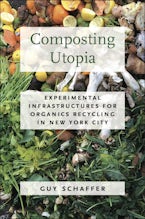
Composting Utopia
Experimental Infrastructures for Organics Recycling in New York City
Published by: University of Massachusetts Press
Series: Activist Studies of Science & Technology
264 Pages, 6.00 x 9.00 x 0.90 in, 8 illus.
Other Retailers:

by Guy Schaffer
Published by: University of Massachusetts Press
Series: Activist Studies of Science & Technology
264 Pages, 6.00 x 9.00 x 0.90 in, 8 illus.
Other Retailers:
New Yorkers generate millions of tons of trash annually, which, through the magic of infrastructure and one of the largest waste management systems in the world, disappears from city sidewalks each night. Under pressure from environmentalists, activists, policymakers, and industry, the New York City Department of Sanitation started exploring ways to divert organic material from the waste stream, and in 2013, launched its composting pilot program.
Drawing on three years of ethnographic fieldwork with community composters and microhaulers in New York City, alongside the rollout of the city’s curbside organics collection system, Composting Utopia describes how local, grassroots organizations intervened in the city’s waste system, enacting change and presenting an alternative vision of the composting city. As Guy Shaffer argues, movement-driven infrastructure projects develop new tools for organizing the world, give communities agency over urban design, and promote just sustainability.
GUY SCHAFFER is lecturer in science and technology studies at Rensselaer Polytechnic Institute.
“Composting Utopia offers a fresh critique of neoliberal waste management and examines the tensions between formal and informal composting as straddling the boundary between neoliberal sustainability and transformative sustainability.”—Giovanna Di Chiro, professor of environmental studies at Swarthmore College and coeditor of Appropriating Technology: Vernacular Science and Social Power
“Schaffer is clearly invested in and hopeful about what community infrastructures can do, but with a critical and analytic eye. Based on sound data and with wonderful insight, Composting Utopia is an important contribution to science and technology studies.”—Kim Fortun, author of Advocacy after Bhopal: Environmentalism, Disaster, New Global Orders
This website uses cookies so that we can provide you with the best user experience possible. Cookie information is stored in your browser and performs functions such as recognising you when you return to our website and helping our team to understand which sections of the website you find most interesting and useful.
Strictly Necessary Cookie should be enabled at all times so that we can save your preferences for cookie settings.
If you disable this cookie, we will not be able to save your preferences. This means that every time you visit this website you will need to enable or disable cookies again.
